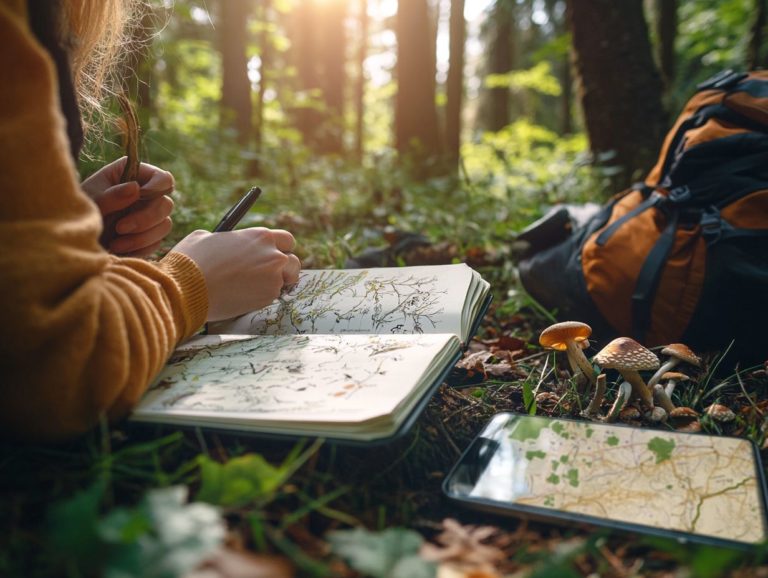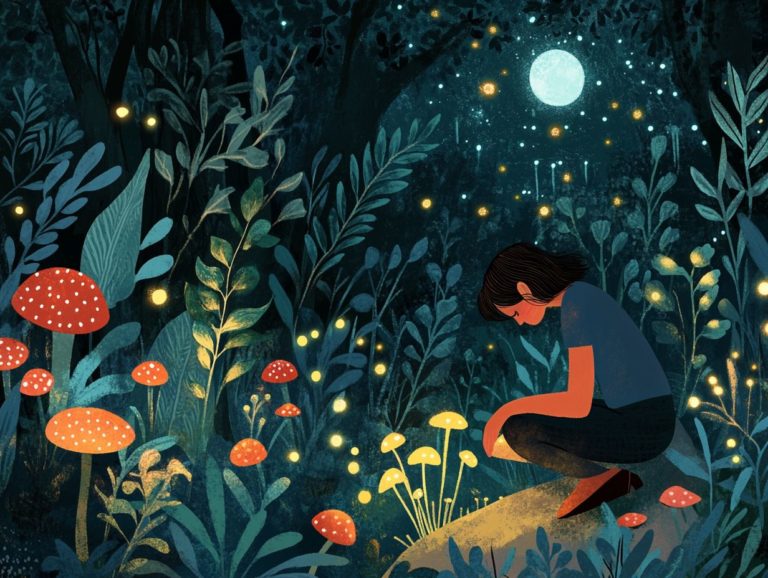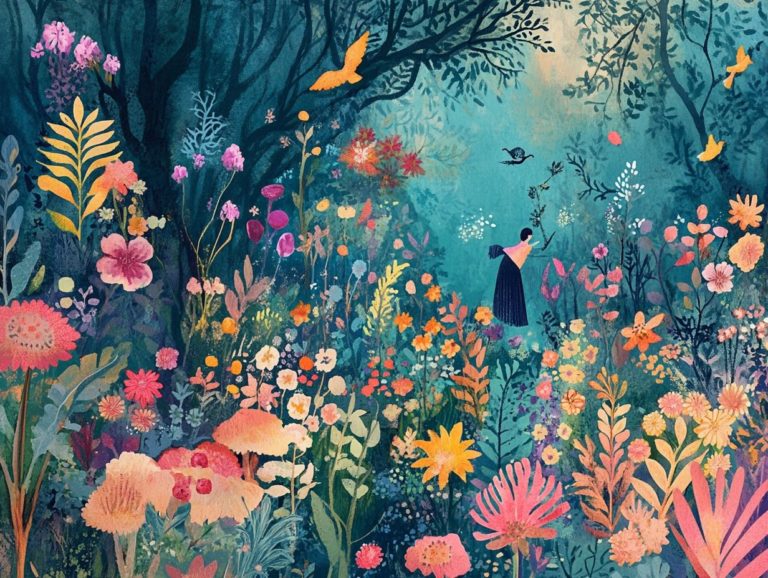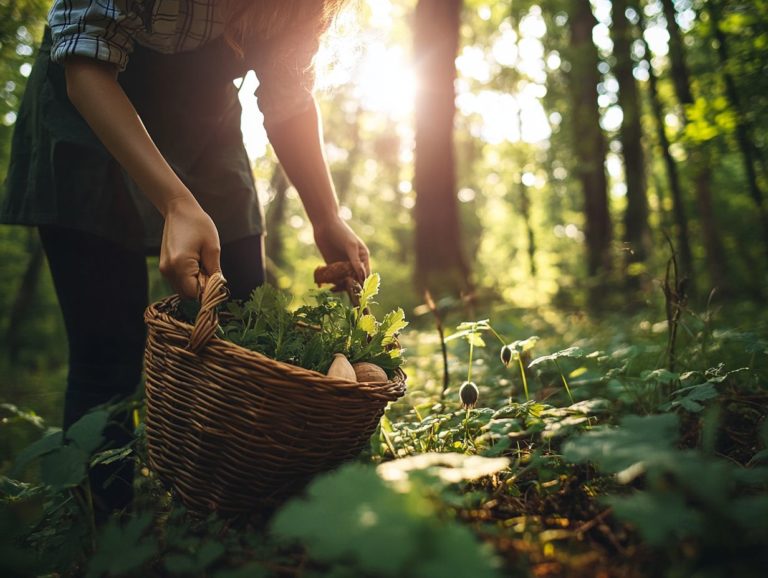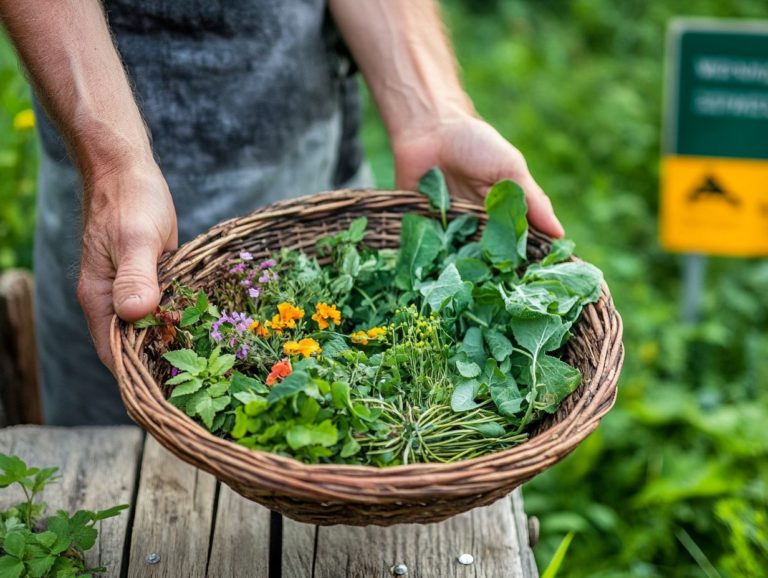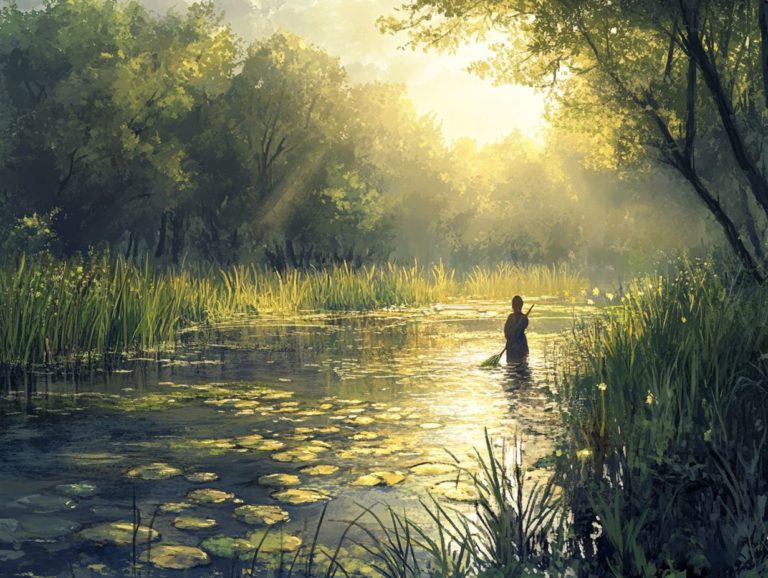How Can I Learn More About Foraging?
Foraging transcends mere trendiness; it offers you a unique opportunity to connect with nature and discover the hidden treasures growing all around you. Are you curious about what treasures await you in the wild? Let s dive in!
This article delves into the myriad benefits of foraging, ranging from enhancing your health to nurturing the environment. It offers valuable guidance on embarking on your own foraging journey, complete with tips for identifying edible plants and the essential tools you’ll need.
You’ll also find essential safety precautions and ethical practices to ensure your foraging is sustainable. Don t wait any longer embrace the wild today!
Contents
Key Takeaways:
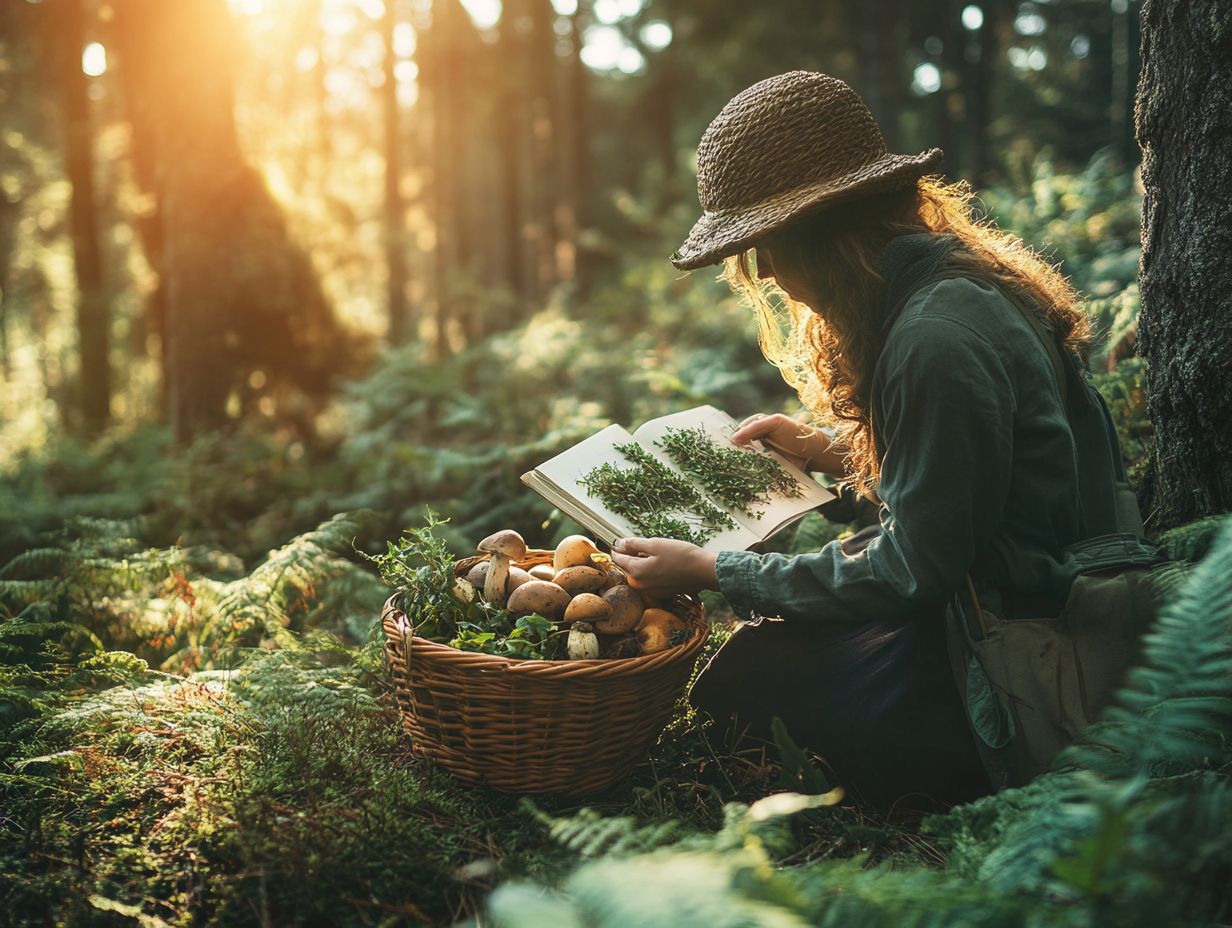
- Foraging can provide numerous health and environmental benefits such as access to nutrient-rich foods and reducing food waste.
- Get started with foraging by learning how to identify edible plants.
- Invest in the necessary tools and equipment.
- Ensure safety while foraging by being aware of potential risks and taking necessary precautions.
- Practice responsible foraging ethics to preserve and protect the environment.
What is Foraging?
Foraging is the art of searching for and gathering wild edibles from the great outdoors, including a diverse array of plants, mushrooms, and herbs nestled within local ecosystems. To enhance your skills, it’s helpful to explore the best foraging books available.
Historically, this vital skill has been crucial for human survival, enabling communities to thrive in various environments long before agriculture came onto the scene. Today, the significance of foraging is as pertinent as ever, with more individuals embracing this age-old practice to uncover alternative food sources while deepening their connection to the environment.
By mastering survival skills rooted in tradition, you not only enhance your own health but also play a part in promoting biodiversity and environmental sustainability. In a world increasingly saturated with processed foods, the urge to reconnect with nature through foraging is gaining momentum, paving the way for a more sustainable future.
Benefits of Foraging
Foraging presents a wealth of benefits that extend beyond the mere act of gathering food. This practice bolsters your personal health while nurturing environmental sustainability.
Additionally, foraging cultivates community spirit through shared experiences and outdoor education, fostering a profound appreciation for nature and its invaluable resources.
Health Benefits
The health benefits of foraging are truly remarkable, as wild edibles are often more nutritious than cultivated foods. By incorporating foraged delights such as edible flowers, mushrooms, and local herbs into your diet, you can savor unique flavors while enhancing your overall well-being.
Dandelion Greens
Take dandelion greens, for example. They are a nutrient powerhouse, brimming with vitamins A, C, and K, plus antioxidants that may help reduce inflammation.
Wild Garlic
Then there’s wild garlic, which not only elevates your dishes with its distinct flavor but also brings along beneficial compounds that support heart health and exhibit antimicrobial properties.
Mushrooms
Mushrooms like reishi and lion’s mane have earned their accolades for their immune-boosting capabilities and potential brain health benefits, respectively. By embracing these wild treasures, you can enrich your diet with a diverse array of natural nutrients while deepening your connection with the environment around you.
Ready to start your foraging adventure? Grab your basket and head outside!
Environmental Benefits
Foraging offers remarkable environmental advantages. It encourages sustainable practices by tapping into local, natural resources while decreasing reliance on commercially produced food that often harms delicate ecosystems.
By engaging in foraging, you play a vital role in controlling invasive species and contributing to the preservation of local biodiversity.
This practice fosters a profound connection to the environment. It inspires you to appreciate and protect the land that provides these resources.
In many regions, invasive species upset the delicate balance of ecosystems. This results in a decline of native flora and fauna. By incorporating these invaders into your foraging efforts, you mitigate their impact and aid in restoring ecological integrity.
As more individuals embrace foraging, a collective shift toward environmental appreciation and stewardship unfolds. This promotes practices that safeguard natural habitats for generations to come.
How to Get Started with Foraging
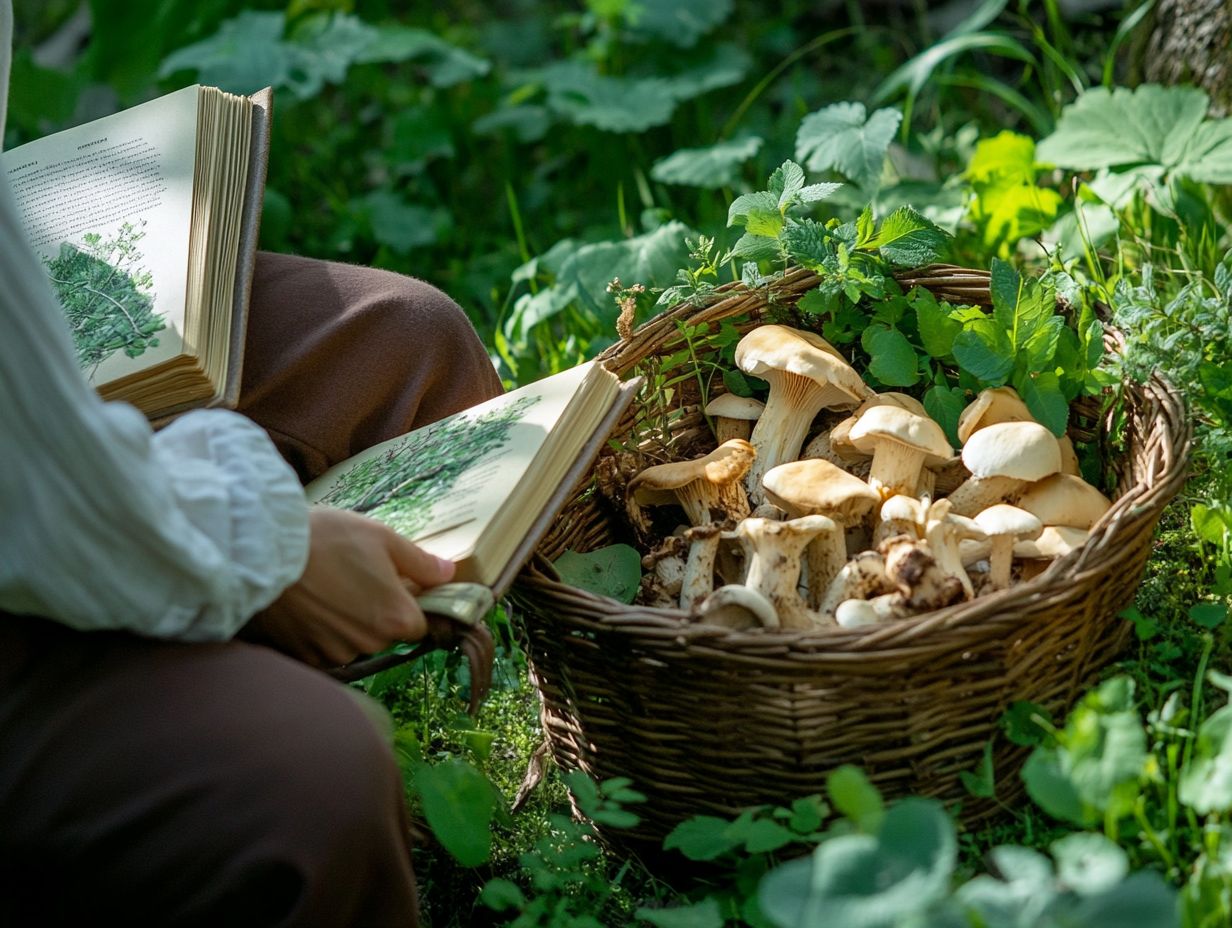
To start foraging, you need a harmonious blend of knowledge, the right tools, and active community engagement. You must arm yourself with essential survival gear, including reliable field guides. Additionally, learning how to educate others about foraging can enhance your experience. It’s also important to acquire effective cooking techniques for transforming wild foods into delicious dishes.
Joining foraging groups offers hands-on learning experiences. You can connect with local foragers eager to share their insights, and you might also discover what local foraging classes are available.
Identifying Edible Plants
Identifying edible plants is an essential skill in foraging. It demands keen observation and a solid grasp of the local flora. Understanding the characteristics of various wild edibles, such as dandelions and herbs, is crucial for gathering safe food and avoiding harmful plants.
Keep in mind that visual cues like leaf shapes, flower colors, and growth patterns are your best friends. These details provide invaluable insights into a plant’s nature.
Seasonal variations also affect the appearance of edible species. Spring often brings tender greens, while summer showcases an abundance of berries. Recognizing unique features, like the unmistakable scent of wild garlic or the distinct taste of clover, can enhance your identification skills.
Stay safe while foraging. Always consult multiple reliable sources or experts before consuming any wild plant, as misidentification could lead to serious health risks. Prioritize your safety and enjoy discovering nature’s bounty.
Tools and Equipment
To start your foraging adventure, equip yourself with the right tools. A reliable field guide for identifying wild edibles and specialized tools for mushroom hunting will enhance your experience while ensuring safety and efficiency.
A sturdy basket for collecting your finds and a pocket knife for easy harvesting are critical. Don t forget a compass or GPS device to keep you on the right path.
Gloves to protect your hands and a notebook for jotting down observations are equally important. These can be invaluable for your future trips.
In terms of mushroom hunting, a soft brush is a smart addition for cleaning dirt off the caps without causing damage.
Investing in highly recommended field guides will provide you with crucial information about both edible and poisonous varieties, enabling you to distinguish between them confidently. Additionally, building your foraging knowledge base through resources like online communities and local workshops can offer invaluable support and knowledge to enhance your foraging skills.
Foraging Safety
Your safety while foraging is crucial! Understand the potential risks and implement necessary precautions to avoid harmful plants and other hazards in the wilderness, especially in emergencies.
By mastering the art of plant identification and knowing what to avoid, you can ensure a safe and enriching experience while gathering edible resources.
Potential Risks and Precautions
Understanding the potential risks of foraging is essential for ensuring your safety. Misidentifying plants can lead to serious health issues, including poisoning.
To mitigate these dangers, take precautions such as researching edible species, consulting reliable resources, and going foraging with knowledgeable friends.
Remember, even well-known edible plants can have toxic look-alikes that pose a threat if consumed. Start by investing time in learning about common local flora perhaps through field guides or forage workshops that offer hands-on experience.
Foraging in diverse environments can enhance your knowledge, but it also presents challenges, such as environmental contamination. Always harvest responsibly by taking only what you need and leaving enough for wildlife.
This approach fosters sustainable practices while protecting your well-being. By approaching foraging with the right blend of respect and caution, you can safely enjoy the rewarding gifts nature has to offer.
Foraging Ethics
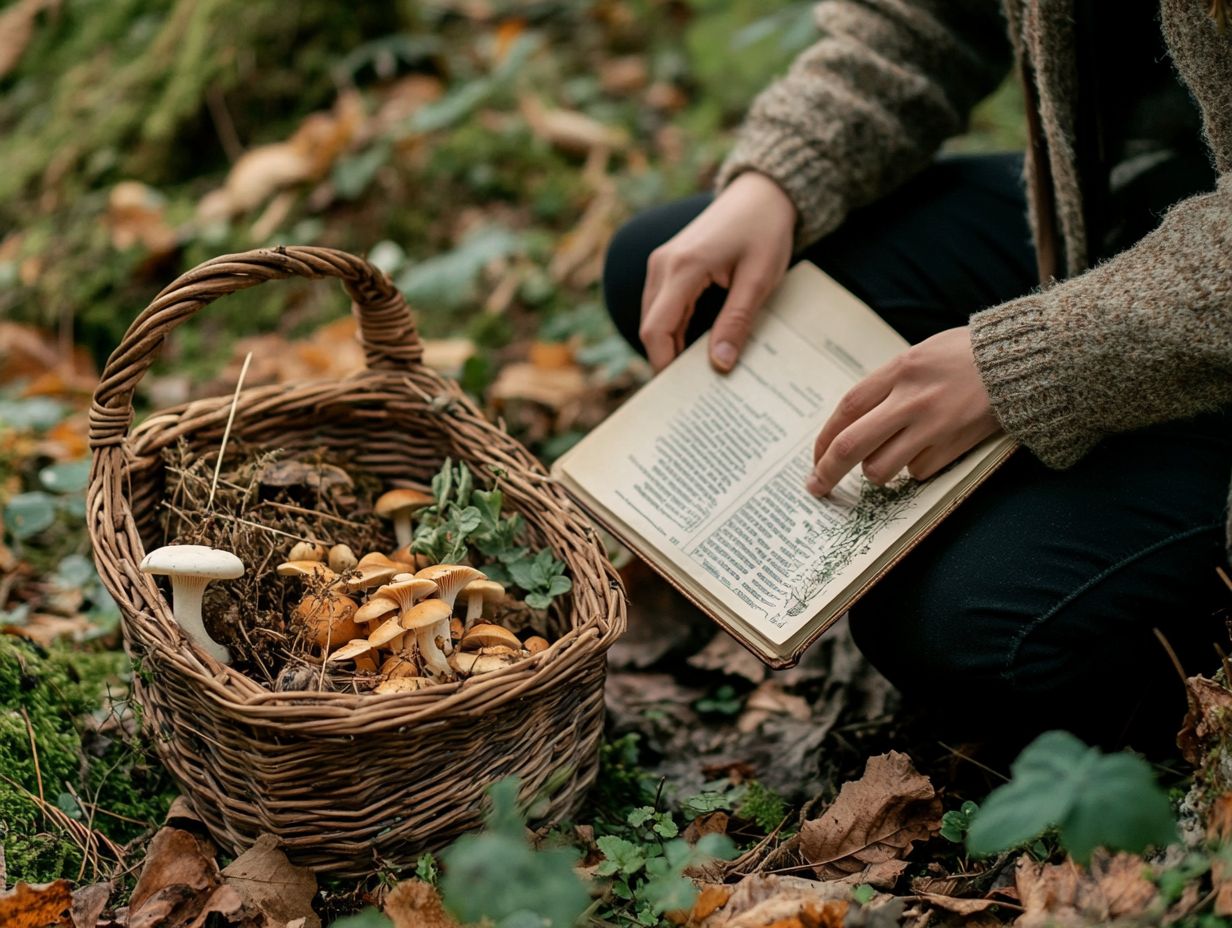
Adhering to foraging ethics is crucial for ensuring sustainable practices and safeguarding the natural environment. By embracing responsible methods such as leaving ample resources for wildlife and minimizing your environmental impact you contribute to a culture of conservation.
This not only improves your skills but also deepens your appreciation for nature.
Responsible Foraging Practices
Responsible foraging practices are essential for ensuring the long-term sustainability of wild food sources and preserving nature for generations to come.
By following guidelines that prioritize food sovereignty which means having the right to healthy and culturally appropriate food produced through ecologically sound methods and sustainable practices, you can enjoy the bounty of wild edibles while simultaneously protecting delicate ecosystems.
Techniques like selective harvesting, where only mature plants are gathered, are key in preventing overexploitation and promoting healthy regrowth.
You can also enhance local biodiversity by caring for foraged areas. Planting native species or removing invasive plants makes a significant difference.
Engaging with community groups focused on ethical foraging allows for a rich exchange of knowledge and encourages a shared respect for the environment.
For example, participating in local foraging workshops enables you to appreciate not just the food you gather but also the intricate ecological relationships within your habitats.
This collaborative spirit amplifies the positive impact of responsible foraging and deepens your connection to nature. It reinforces the vital role that community plays in safeguarding our natural resources.
Resources for Learning More About Foraging
Exciting resources await you! You can explore insightful books, informative websites, online classes, and local foraging communities offering hands-on learning experiences.
By engaging with these resources, you not only refine your foraging skills but also cultivate deeper connections within your community through the sharing of knowledge and experiences.
So grab your basket and start exploring! Nature’s bounty is just waiting for you.
Books, Websites, and Classes
Numerous books and educational websites serve as excellent resources if you’re interested in mastering foraging. For beginners, it’s essential to understand what should beginners know about foraging, covering everything from plant identification to cooking with wild edibles.
Local classes and workshops offer invaluable hands-on experience. These allow you to hone your skills while fostering a sense of community among participants.
A standout recommendation is “The Forager’s Harvest” by Samuel Thayer. This book offers clear guidance on how to gather and prepare wild plants. Additionally, exploring resources for foraging can enhance your knowledge. Online platforms like the Foraging Course from Wild Food UK provide structured lessons for all skill levels, making it easy to find the right fit for your learning style.
Engaging in community foraging events enhances your practical knowledge and connects you with like-minded enthusiasts, creating a supportive network. To get started, you can explore resources on how to start foraging for wild edibles. Local botanical gardens often host foraging walks that emphasize responsible harvesting and the importance of biodiversity. This ensures that you learn about edible plants while developing respect for their delicate ecosystem.
Frequently Asked Questions
What is foraging and why should I learn more about it?
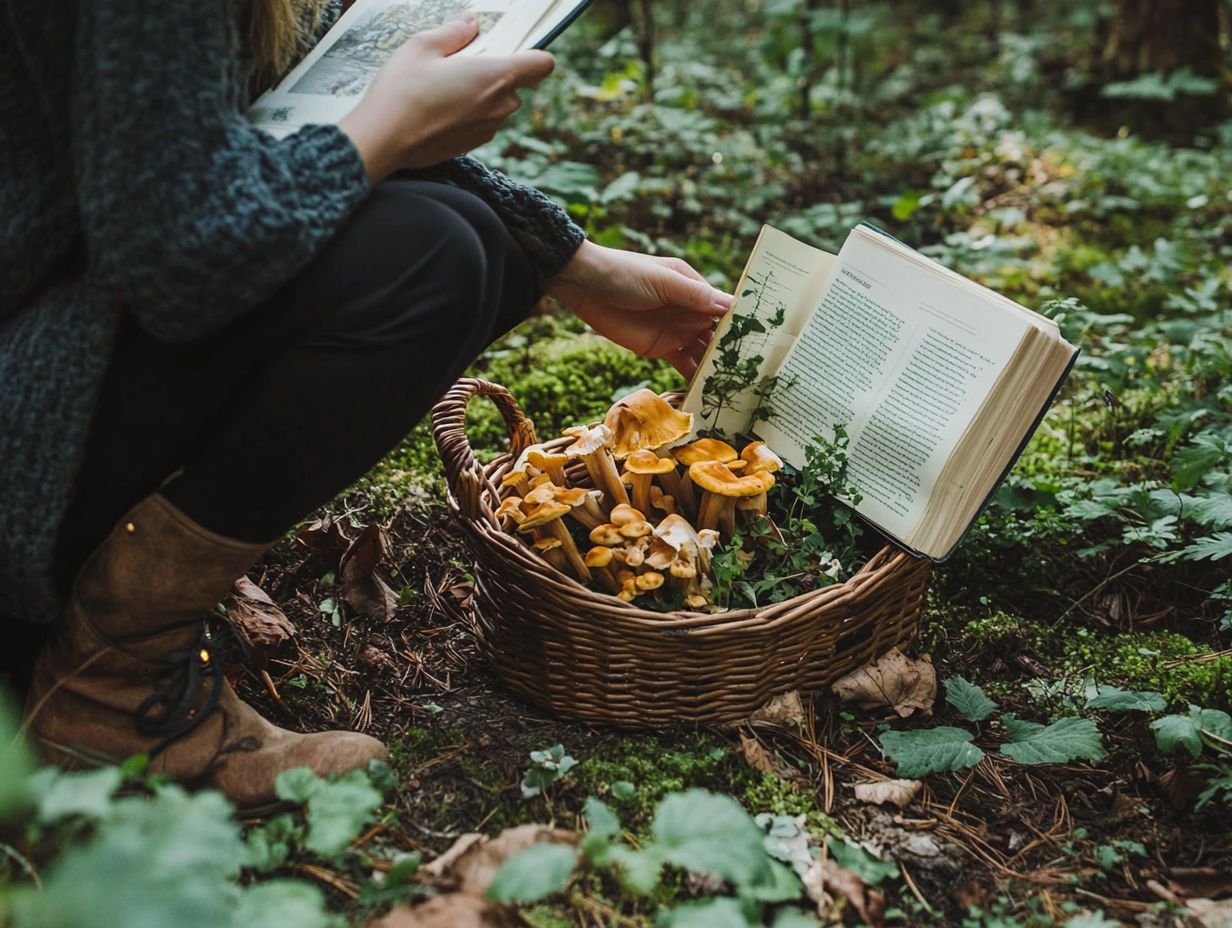
Foraging is gathering wild food like plants, fruits, and nuts for personal consumption. Learning about foraging helps you connect with nature, save money on groceries, and discover the best resources for local foraging, ultimately contributing to a sustainable lifestyle.
How can I get started with foraging?
Dive into the world of foraging! Start by learning about the plants and their seasonal availability in your local area. If you’re wondering how to get started with foraging, you can also join a foraging group or take a class to learn from experienced foragers.
Are there any safety precautions I should take while foraging?
Yes, it s crucial to properly identify plants before consuming them. Wear protective clothing and gloves, and forage in areas free from pollution and pesticides.
What are the benefits of foraging for my health?
Foraging for wild foods provides a rich source of nutrients, antioxidants, and medicinal properties that benefit your overall health and well-being.
Can I forage in urban areas?
Absolutely! Many edible plants can be found in urban areas such as parks, sidewalks, and abandoned lots. Just make sure to follow safety precautions and obtain permission from the landowner if needed.
How can I incorporate foraged foods into my meals?
Foraged foods can be used in various ways, such as in salads, soups, smoothies, and even baked goods. Get creative and experiment with different recipes to enjoy nature’s bounty!
Join a local foraging group today and start your foraging journey now!

